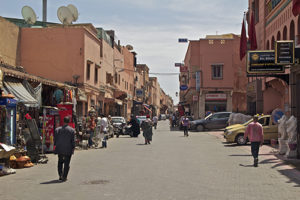Charles has been in ministry to Muslims for thirty years, many of those with Arab World Media. As he approaches retirement, we asked him to reflect on how things have changed in that time…
Today a Muslim enquirer in the Arab world can find a phone number on a Christian website or a satellite TV programme, make a call at minimal or no cost (if they have an internet connection) and speak to an Arab believer. This is a truly amazing development!
 The way it was
The way it was
When I first visited Morocco in the early 1980s, there was only one TV channel and the news focussed mainly on the king’s activities. In order to make an international phone call, I had to go to the main post office, and it was quite expensive. If Moroccans were interested in the gospel, their best chance of hearing it would probably have been on the radio – one or two hours of broadcasting each evening on Trans World Radio. After that they could correspond with a media organisation and do a simple Bible correspondence course. Later, it might be possible to arrange for them to meet with a believer – often an expatriate visitor.
 The digital revolution
The digital revolution
Today our response workers are able to send an electronic copy of the Bible to their contacts via WhatsApp. It is true that many also ask for a hard copy, because reading from a phone screen is tiresome. Nevertheless, the opportunity to find out about the gospel has mushroomed through satellite TV, the internet and, most recently, social media. What will come next? Perhaps the most exciting aspect of all this is the opportunity that has opened up for national believers to be directly involved, sharing their testimonies on YouTube and interacting with interested enquirers, both online and face to face.
Obstacles
 But, though technology has advanced, many challenges remain the same… The greatest obstacle in the Muslim world is still its hostility towards the gospel. A person who wants to find out more about Christianity can expect great difficulties if their interest becomes known. Our contacts often stress to us that our interaction with them must remain strictly confidential. Sometimes, even if they have truly trusted in Christ, they are too fearful to meet another believer. Can they be sure of that person’s sincerity? What if their faith became known? Might they be ostracised or even killed?
But, though technology has advanced, many challenges remain the same… The greatest obstacle in the Muslim world is still its hostility towards the gospel. A person who wants to find out more about Christianity can expect great difficulties if their interest becomes known. Our contacts often stress to us that our interaction with them must remain strictly confidential. Sometimes, even if they have truly trusted in Christ, they are too fearful to meet another believer. Can they be sure of that person’s sincerity? What if their faith became known? Might they be ostracised or even killed?
For a long time, my prayer has been that things will change; that parents will allow their children freedom of conscience, freedom to search, freedom to adopt another faith. Until that time comes, new believers, and even enquirers, will continue to suffer.
However, in many countries there has been a significant change in attitudes towards Islam. In our media ministry, we first became aware of this in the 1990s, a decade of terrible civil war in Algeria. The Algerian army’s refusal early in 1992 to accept the almost certain victory of the Islamic Salvation Front in parliamentary elections led to appalling violence, with atrocities committed by both sides. We began to receive letters saying, ‘If this is Islam, we must find something else’. The situation in Algeria finally stabilised in the late 1990s, but it is estimated that 250,000 people lost their lives.
Today the horrors of Daesh (ISIS) have also brought many to the same kind of disillusionment and questioning. Clearly, this presents an opening for the gospel and Christ’s message of love.
 The same challenges
The same challenges
The challenge of media ministry remains essentially the same, even though media itself has changed. Instead of radio programmes and magazines, we produce websites, videos and Facebook posts. The material must still be relevant, interesting and challenging. It must stimulate the enquirer to enter into personal contact. The answers no longer come a week or more later in long awaited letters, but often immediately through WhatsApp and live chat. However, these answers must still be sympathetic and helpful, and deal satisfactorily with the many common objections raised by Muslims. We must always keep in mind the goal of seeing the enquirer come to Christ and be connected to a local fellowship.
Then comes the challenge to grow in faith and to become a fruitful witness. How can we as a media ministry enable and support new believers better? Interest in this area has grown greatly in recent years. Thirty years ago, we were delighted if someone believed. It was a tremendous subject of praise and thanks. But now – and rightly so – Christian workers in the Arab world have started to think in terms of a harvest; of seeing not just one believer, but a potential church, and not just a church but a church that will multiply and become a movement.
We are just beginning to see such movements in the Arab world. David Garrison, in his book A Wind in the House of Islam, records just two such movements in the Arab world out of over seventy in the Muslim world as a whole. We must pray that there will be many more.